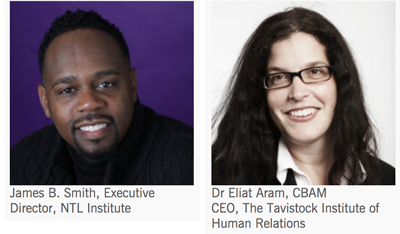National Training Laboratories (USA) and TIHR (UK) meet up again
National Training Laboratories (USA) and TIHR (UK) meet up again
Posted
13 February 2018
These two august bodies with common histories, aims and values have re-established connections and are up to something great!
Recent meetings between representatives of the NTL and the TIHR were timely reminders of our mutual histories through the ground-breaking work of Kurt Lewin, the father of social psychology and pioneer in the field of action research. Lewin claimed that increased awareness of self and others could be accomplished through facilitated group dialogue that advocated open-minded appreciation and inclusion of differences. Lewin’s research convinced him that learning-from-experience methods, rather than lecture and reading, provided high potential for diagnostic study, evaluation and, most importantly, for changing individual and social behaviour.
While Lewin emphasized the importance of theory, he also believed that theories needed to have practical application. He applied his research to the war effort and he established Group Dynamics at the Massachusetts Institute of Technology and the NTL. During his career, Lewin developed many theories, including theories that emphasized the importance of individual personalities, interpersonal conflict and situational variables. One of Lewin’s most important theories was Field Theory, where he proposed that behaviour is the result of individual and environmental factors. This theory had a major impact on social psychology, supporting the notion that our individual traits and the environment interact to cause behaviour. Lewin was one of the first psychologists to systematically test human behaviour, influencing experiential adult learning, social psychology and human interaction.
Notions of action research and of integrating theories of the British object relations school of psychoanalysis and field psychologies exerted a steady influence on the initial formation of the TIHR in London and on its subsequent professional identity and approach to work. Some notions central to the Tavistock Institute’s ‘house style’ can be traced back to when founding staff members were influenced significantly by the work of Kurt Lewin (See Dr Jean Neumann: ‘Kurt Lewin at the Tavistock Institute’)
At the NTL and the TIHR, the label ‘dynamic approach’ indicates the necessity of discovering multiple forces at work in any situation. This means that no matter where practitioners enter an organisational development or change process, they need to be prepared to use many levels of analysis to understand what is going on within the social system. What is affecting the people who are leading, managing and existing in the midst of the change and development?

The common approach of the NTL and the TIHR involves a dynamic evaluation of the ‘elements of any situation as parts of a system’; in other words, the component parts relate with each other forming a complex whole that connects in ways to be discovered through action and study.
Today, 70 years later, the world is ever-more complex. With economic, social, and geopolitical systems in constant change, there are concerns about the stability of society and the planet. Our social and political systems themselves may be both the sources and the solutions to the challenges produced by that complexity. We look to each other, as inter-dependent individuals, groups and communities to navigate our way through and to solve complex issues. Since WWII, the TIHR and NTL have worked to improve humanity through their understanding of the nature of the human experience and the importance of how we engage with each other.
Building on interpersonal effectiveness and societal well-being, TIHR and NTL have developed theoretical frameworks and social research tools to help us to understand human dynamics. The work of both organizations has had a significant impact on important social issues. As both organizations look to the future, there is a renewed sense of vigour and commitment to work together to galvanize and inform change.
Societal change begins at the individual level—a foundational element embraced by both organizations. We hold that in order to create harmonious communities and successful enterprises whether manufacture, commercial, government, non-profit or voluntary, we pay attention to human, personal and collective development. TIHR and NTL firmly believe in improving our world through scientific research and empathic understanding of human connections, interactions and dynamics at every level.
The Tavistock Institute for Human Relations in London and the National Training Laboratories Institute in Washington, are planning jointly-sponsored events that will take place in 2018. Watch this space!
Dr Mannie Sher, PhD
Principal Researcher & Consultant
The Tavistock Institute of Human Relations